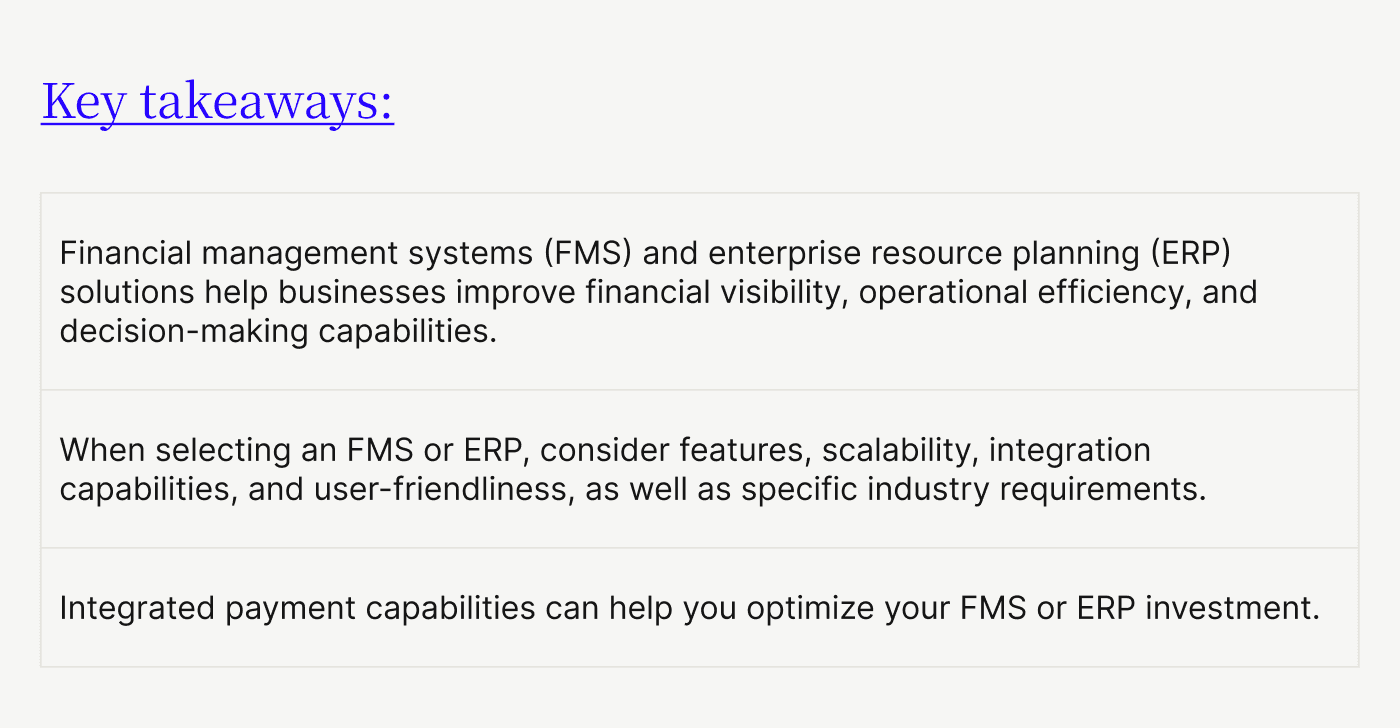
Shopping for a Financial Management System? Add Integrated Payments to the List
- 18 min read
Financial management systems are invaluable. They streamline financial operations and help you make better decisions.
In this article, you'll learn the full scope of benefits of FMSs, what to consider when evaluating solutions, and how to ensure that your payment processing operations don’t dilute your investment.


Businesses that want to better measure, analyze, and optimize their financial performance often deploy financial management systems (FMS) and enterprise resource planning (ERP) systems. These solutions are invaluable for streamlining financial operations and extracting insights for better decision-making.
Businesses that adopt these solutions, however, often overlook the importance of integrated payment processing during their evaluation phases. Not having or being able to integrate payments into your FMS or ERP can hinder how fully optimized your financial operations are. And this defeats the whole purpose of adopting a financial management solution.
In this article, we’ll cover the benefits of financial management software, what to consider when evaluating solutions, and how to ensure that your payment processing operations don’t dilute your FMS / ERP investment.
Table of contents:
Key features of financial management systems
FMSs offer a variety of features to help improve your company's financial health. At the core of these systems is general ledger management functionality, which serves as a central repository for all your financial data and transactions.
This centralized approach ensures data consistency by automatically updating all related entries across the system when a transaction is recorded, eliminating discrepancies between different financial records. It also provides a single source of truth for financial reporting, allowing all stakeholders to work with the same up-to-date information.
Other key components of FMS solutions are accounts payable and accounts receivable modules. These components can help reduce manual work and minimize errors that lead to time-consuming, corrective actions. By automating certain functions, you can improve your cash flow management and maintain better relationships with your vendors and customers.
The 4 elements of financial management
Financial management comprises four key elements: planning, organizing, directing, and making decisions. An effective FMS platform supports each of these areas:
1. Planning
This involved developing step-by-step strategies to achieve long-term business goals, such as expanding gross margins, growing revenue, or entering new markets. Financial management systems facilitate this by providing tools for creating realistic financial projections and accurate budgets.
You'll find it easier to plan with an FMS because it typically offers historical data analysis, trend forecasting, and scenario modeling capabilities.
2. Organizing
Once your plans are set, your finance team must find the resources necessary for execution. Financial management solutions can help you determine what equipment, staff, software, and other things you need to reach your goals.
3. Directing
As you execute your plans, financial management platforms let you track your progress, identify discrepancies, and make data-driven adjustments in real time.
4. Making decisions
And speaking of adjustments… Decision-making relies on accurate and timely financial information. An FMS supports this by delivering comprehensive data and providing analytical tools, empowering you to make informed choices that drive the business forward.
For example, you might use FMS data to decide whether to invest in new equipment, expand into a new market, or adjust pricing strategies based on profitability analyses.
The difference between financial management systems and ERPs
While financial management and enterprise resource planning systems are similar, they serve distinct purposes within an organization. ERPs are broader solutions that include modules for financial management, but also cover areas such as sales and services, inventory, supply chain, and quality assurance. FMSs are often more specialized, focusing solely on your company's financial operations.
The choice between an FMS and an ERP often depends on the nature of your business. Larger companies that need to manage complex supply chains and inventory typically benefit from the comprehensiveness of an ERP. In contrast, service-based businesses like law offices or accounting firms, which don't manage physical inventories, may find that a standalone FMS better suits their needs.
It's worth noting that some ERP systems have particularly strong financial management capabilities. Here are a few that get rave reviews from finance teams:
4 benefits of implementing financial management systems
Implementing a financial management system or an ERP can really make a difference for organizations, especially those that are bogged down by manual processes and fragmented data sources. Here are four key benefits you can realize with the right financial management solution in place:
1. Improved visibility and control
By centralizing financial data and providing convenient access to that information, an FMS lets stakeholders at all levels gain a clear, real-time view of their company's financial status. This transparency helps identify trends, spot potential issues, and make more accurate forecasting and planning decisions.
2. Operational efficiency
Financial management solutions automate many manual processes, from data entry to report generation. Having these automations not only saves time but also reduces the risk of human error. For finance teams, this means less time spent on routine tasks and more time available for strategic activities that add value to the business.
3. Compliance
Many financial management systems offer built-in controls, audit trails, and reporting tools designed to meet specific regulatory requirements. For example, an FMS could automatically generate Sarbanes-Oxley (SOX) compliant financial reports, ensuring accurate disclosure of financial information and maintaining the integrity of financial data.
4. Risk management
By providing a comprehensive view of financial operations and enabling detailed analysis, FMS and ERP systems can help you identify potential risks early. Whether it's cash flow problems, credit risks, or market fluctuations, an FMS equips your finance team with tools that can help anticipate and mitigate financial risks effectively.
On-premises vs. cloud-based financial management systems
When choosing a financial management solution, one of the key decisions businesses face is whether to opt for a traditional on-premises system or a modern cloud-based solution. While both types can be effective, cloud-based FMS solutions have gained significant popularity in recent years.
Cloud-based systems offer unparalleled accessibility and collaboration features. With these solutions, team members can access financial data and perform tasks from any location, leading to more efficient workflows and faster decision-making.
Another advantage of cloud-based FMS solutions is that they’re automatically updated by the provider. This ensures that users always have access to the latest features and security patches, without the need for IT intervention.
Speaking of security… This is a primary concern when it comes to financial data, and cloud providers have risen to the challenge. Many cloud-based FMS solutions offer enhanced security measures and reliable data backup, which can be particularly beneficial for organizations with limited IT resources.
These FMS providers typically invest heavily in state-of-the-art security infrastructure and employ teams of security experts, often providing a level of protection that would be difficult and costly for individual businesses to replicate in-house.
Now, while cloud-based FMSs offer numerous advantages, on-premises systems may still be the preferred choice for some organizations, particularly those with specific regulatory requirements or unique security needs. For example, a government agency that handles highly sensitive data may prefer to keep its financial management system on-premises to have more control over its architecture and reduce the chances of a data breach or network attack.
8 signs your accounting team needs an FMS
As businesses grow and financial processes become more complex, there comes a point when basic accounting software or manual methods are no longer sufficient. Here are some tell-tale signs that your accounting team might benefit from implementing a financial management system:
1) Excessive manual data entry — If your team spends hours each week manually entering data into spreadsheets or transferring information between different systems, it's a clear indicator that you need a better solution.
2) Difficulty in producing timely reports — When it takes days or weeks to compile financial reports, or if you're constantly struggling to meet reporting deadlines, an FMS can streamline this process.
3) Lack of real-time financial visibility — If you can't easily access up-to-date financial information or have to wait for month-end closes to understand your current financial position, an FMS can provide the real-time insights you need.
4) Compliance challenges — If your team struggles to keep up with changing regulations or spends an inordinate amount of time preparing for audits, an FMS with built-in compliance features can be a game-changer.
5) Scaling issues — As your business grows, if you find your current financial processes aren't keeping pace or are becoming increasingly error-prone, it's time to consider an FMS.
6) Inefficient approval processes — If approvals for purchases, expenses, or other financial transactions are slow and cumbersome, an FMS can help streamline these workflows.
7) Data inconsistencies — If you frequently encounter discrepancies between different financial reports or data sources, an FMS can provide a single source of truth for all your financial data.
8) Limited collaboration — If your finance team struggles to collaborate effectively with other departments or remote team members, a financial management system can facilitate better information sharing and teamwork.
Recognizing these signs early can help you make the transition to an FMS before inefficiencies begin to impact your business operations and financial health.
The relationship between integrated payments and financial management systems
FMS and ERP platforms typically don't include payment processing capabilities for their clients. This essential function must be handled separately, either as a standalone service or through integration with the FMS / ERP system. When payment processing is managed separately, it creates a disconnect between financial data management and actual payment transactions, potentially leading to inefficiencies and missed opportunities for optimization.
Plus, the more hands a payment passes through, the more vulnerabilities exist. Integrating payments into your existing systems makes for a significantly better customer experience and shuts the door on potential fraudsters.
Integrating payment processing directly within your FMS or ERP offers significant advantages by bringing both functions together in one unified platform, streamlining operations, and providing a more comprehensive view of your financial processes.
A core benefit of payment integration is the further elimination of manual accounts receivable processes. By enabling digital payments and automating payment reconciliation, for example, you can reduce the time and effort spent on processing payments and matching payments to invoices.
Improved cash conversion and working capital management are other key advantages of integrated payments. Digital payments are inherently faster to process and reconcile than physical payments like checks. By enabling faster payments and supporting multiple payment channels—like POS, ecommerce, and more—you can accelerate your cash flow and improve your overall financial health.
Another advantage of integrated payments is cost savings through interchange optimization. Interchange fees, set by credit card networks, vary based on factors such as the type of card used and the information provided with each transaction. When payment processing is integrated with your FMS or ERP, more detailed transaction data can be automatically included with each payment.
This additional data can qualify transactions for lower interchange rates. For instance, providing line-item details or tax information—that’s already available within your existing systems—can often result in better rates for business-to-business transactions. These optimized rates can lead to savings of up to 40% on processing fees, which can be significant if you process a high volume of transactions.
How to select the best FMS or ERP for your business
Choosing a financial management system that best fits your needs can be daunting. The process is often challenging due to the wide array of options available, each with its own set of features, pricing models, and implementation requirements. Additionally, it’s a big decision that will impact your financial operations for years to come.
The investment of time and resources required for implementation, along with the potential disruption to your current processes, can also make the choice seem overwhelming. If you approach the process methodically, however, you should be able to find a solution that's an excellent fit for your business.
Begin by assessing your current financial processes and identifying the problems and inefficiencies within your existing systems. Are there manual processes that could be automated? Are there reporting capabilities you wish you had? Go back and reference those signs your accounting team needs an FMS.
In addition to features, consider less tangible requirements such as scalability and how easy the FMS is to use. Scalability is particularly important if you anticipate growth or seasonal spikes in usage.
And don’t forget payments integration! Many ERPs and financial management software offer online marketplaces that feature their authorized integrated payments partners, such as Versapay. These marketplaces can provide a great starting point for understanding what's available and how different solutions might fit into your existing or planned systems:
Whatever you do, don't rush the decision-making process. Thoroughly research and compare different FMS / ERP providers. Look at customer reviews, case studies, and if possible, request demos or trials of the systems you're considering.
Versapay’s leading integrated payment processing solutions
Versapay stands out as a leading payments integration solution, offering seamless integration with any existing FMS and ERP system. This compatibility ensures a smooth transition and minimal disruption to your current processes.
A core strength of Versapay is its native compatibility with popular ERPs like NetSuite, Microsoft Dynamics, and Sage Intacct. This specialization allows for deep integration and optimized performance with these widely used systems. Be sure to check out these resources:
The benefits integrating Versapay for payment processing within your FMS or ERP are significant and quantifiable. On average, businesses using Versapay report:
30% reductions in manual work, freeing up staff time for more strategic tasks
25% quicker payments, improving cash flow and working capital
20% savings in payment processing fees, directly impacting the bottom line
When you opt for a certified payments solution from a trusted partner like Versapay, you can truly get the most out of your financial management systems. To learn more about Versapay’s ERP Payments solutions, talk with an expert today.
Financial management systems FAQs
What are the most important factors to consider when choosing a financial management system?
Key factors include scalability to accommodate business growth, integration capabilities with existing—or future—systems, user-friendliness, reporting and analytics features, security measures, and the ability to automate key financial processes.
Additionally, consider the system's ability to handle specific industry requirements and its track record with businesses similar to yours.
What are the benefits of using a cloud-based financial management system?
A cloud-based FMS offers several advantages: accessibility from anywhere with an internet connection, automatic updates and maintenance, scalability, enhanced data security and backup, reduced IT infrastructure costs, and easier collaboration among team members.
They also typically offer faster implementation times compared to on-premises solutions.
How does a financial management system improve financial reporting and decision-making?
An FMS centralizes financial data, providing a single source of truth for all financial information. This enables more accurate and timely reporting. Advanced financial management solutions offer customizable dashboards and real-time reporting capabilities, allowing decision-makers to access up-to-date financial information quickly.
Can a financial management system help with regulatory compliance and risk management?
Yes, many FMSs include features specifically designed to aid in regulatory compliance and risk management. These might include built-in controls to ensure adherence to accounting standards, audit trail capabilities to track financial activities, and automated alerts for potential compliance issues.
For risk management, FMS can provide real-time visibility into financial positions, helping to identify potential risks early. Some systems also offer tools for scenario planning and stress testing, which can be valuable for assessing and mitigating financial risks.
What is integrated payments processing and why is it important for a financial management system?
Integrated payments refer to the seamless incorporation of payment processing capabilities directly within a financial management or enterprise resource planning system. It's important because it streamlines financial operations by automating payment acceptance, processing and reconciliation.
This integration eliminates manual data entry, reduces errors, and provides real-time visibility into cash flow. It also enhances security by reducing the number of systems handling payment data. Furthermore, integrated payments can improve the customer experience by offering more payment options and can provide valuable data insights for better financial decision-making.
Overall, it creates a more efficient, accurate, and insightful financial management process.
Why don't ERP systems and financial management solutions typically include payments processing?
ERPs and FMSs often don't include native payment processing capabilities due to the complexity and specialization required in the payments industry. Payment processing involves regulations, security requirements, and evolving technology, which are outside the core focus of most ERP and FMS providers.
Additionally, businesses usually prefer the flexibility to choose their own payment processors. Instead of building these capabilities in-house, many ERP and FMS providers opt to integrate with specialized payment solutions through partnerships or APIs, allowing businesses to benefit from best-of-breed solutions while maintaining the advantages of integrated payments.
About the author

Jordan Zenko
Jordan Zenko is the Senior Content Marketing Manager at Versapay. A self-proclaimed storyteller, he authors in-depth content that educates and inspires accounts receivable and finance professionals on ways to transform their businesses. Jordan's leap to fintech comes after 5 years in business intelligence and data analytics.


